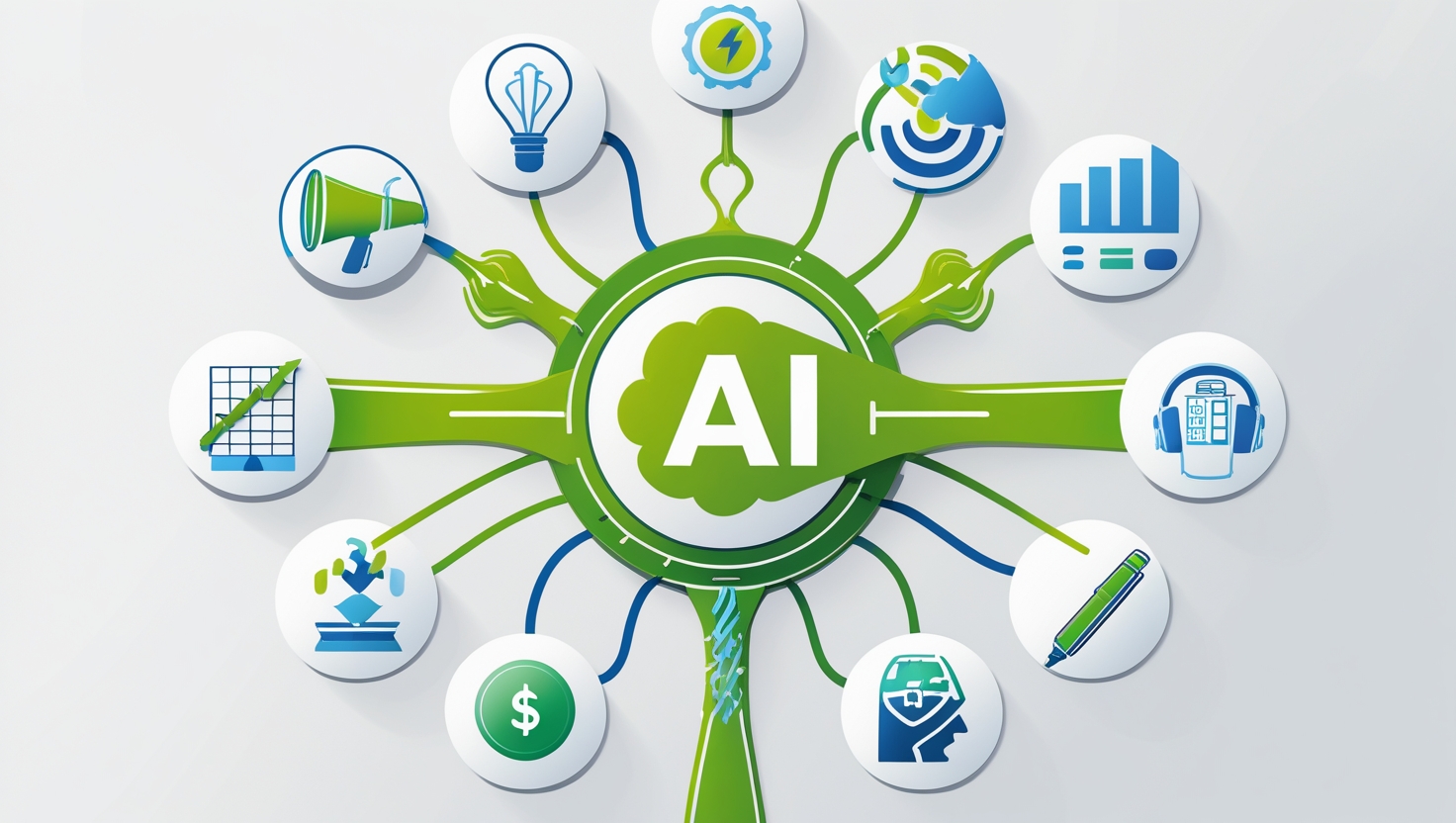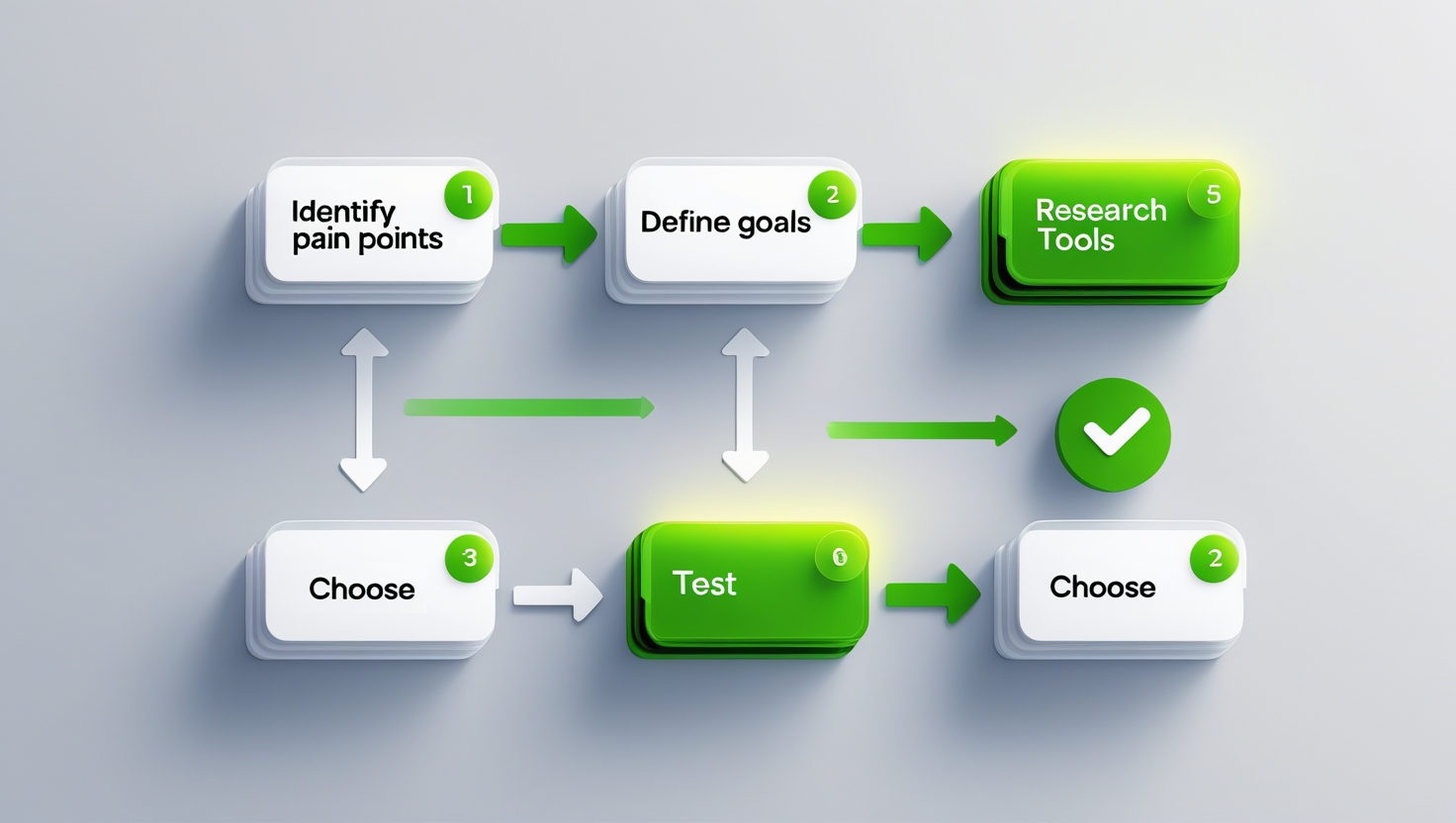Unlock Growth: Must-Have AI Software for Entrepreneurs
Hey there, fellow entrepreneur! Ever feel like you're juggling a million things at once? Marketing, sales, customer support, content creation, managing tasks... it's a lot, right? What if I told you there's a way to get a serious edge, save precious time, and even boost your bottom line without hiring a huge team? Enter the world of AI software for entrepreneurs. Seriously, artificial intelligence isn't just for big tech giants anymore. It's becoming an absolute game-changer for startups, small businesses, and even us solopreneurs. Think of AI tools as your super-smart, always-on co-pilot, ready to tackle those repetitive tasks and give you back the time you need to actually *grow* your business. Ready to dive in and see how these AI tools for entrepreneurs can unlock a whole new level of productivity and profit? Let's get started!
Why AI is Your New Secret Weapon
Okay, let's cut to the chase. Why should you, a busy business owner, even care about artificial intelligence for startups or AI for small business? Simple. AI solutions for entrepreneurs are designed to make things faster, smarter, and more efficient. They can analyze data way quicker than any human, automate tasks that bore you to tears, and even predict future trends or customer behavior. It's like having a whole team of experts working for you 24/7, but without the massive payroll.
Think about it: time is your most valuable asset. Every minute you spend on manual data entry, crafting repetitive emails, or trying to figure out what social media post will actually land, is a minute you're *not* spending on strategy, building relationships, or innovating. AI business automation takes those time sinks and handles them, freeing you up to focus on the big picture. It's not just about saving time, though. AI can help you make better decisions based on solid data, personalize customer experiences at scale, and even create content that resonates with your audience. It's about working smarter, not just harder.

What Exactly is AI Software and How Can It Help Entrepreneurs?
You might be asking, "What exactly *is* AI software anyway?" Great question! At its core, AI software uses algorithms and data to mimic human-like intelligence and perform specific tasks. This can range from understanding natural language (like chatbots) to recognizing patterns in data (like predicting sales trends) or even generating creative content (like writing tools). For entrepreneurs, this translates into practical, actionable help.
How can it help? Oh, the ways are practically endless! AI productivity tools can streamline your workflow, AI business software can manage your customer relationships, and AI startup tools can help you analyze markets faster. It can automate your email marketing, generate product descriptions, analyze customer feedback, schedule social media posts, transcribe meetings, manage your projects, and so much more. Essentially, anything that involves processing information, recognizing patterns, making predictions, or automating a rule-based task can potentially be enhanced or handled by AI. It's about augmenting your own abilities and filling in gaps where you might not have the time or expertise.
Do I Need a Technical Background or Team to Use AI Software?
Okay, deep breath. I hear you. The word "artificial intelligence" can sound super techy and intimidating, right? Like you need a Ph.D. in computer science to even open the software. But here's the good news: for most AI software for entrepreneurs available today, absolutely *not*! Many of the best AI software for new entrepreneurs are designed with ease of use in mind. Think drag-and-drop interfaces, simple prompts, and intuitive dashboards.
Many tools are "no-code AI tools for entrepreneurs," meaning you don't need to write a single line of code. They are built to be accessible to business owners who are experts in their field, not necessarily in programming. Of course, some advanced AI applications might require technical know-how, but the tools we're talking about for everyday entrepreneurial tasks are generally user-friendly. If you can navigate a smartphone app or use a spreadsheet, you can likely handle most of these AI tools. Plus, many providers offer excellent support and tutorials to get you up and running quickly. So, ditch the fear! You don't need a tech team, just a willingness to explore and learn.
What Are the Most Common Use Cases for AI Software in Startups and Small Businesses?
Alright, let's get specific. Where can you actually plug AI into your daily business operations and see real results? The common use cases for AI software in startups and small businesses are growing by the day. Here are some of the heavy hitters:
- Marketing & Sales: This is huge! AI-driven marketing tools for entrepreneurs can help you create compelling ad copy, write social media posts (Hootsuite's OwlyWriter AI is a neat example), personalize email campaigns (AI email automation for entrepreneurs), and even analyze which marketing channels are performing best. AI sales automation for small business can score leads, automate follow-ups, and provide insights into customer behavior. AI for lead generation in startups can help identify potential customers more efficiently. AI-powered CRM for entrepreneurs, like Pipedrive or Zoho, use AI for forecasting and insights.
- Content Creation: Feeling stuck staring at a blank page? AI content creation tools for business are lifesavers. Tools like Jasper or Copy.ai can generate blog post outlines, draft articles, write product descriptions, and even brainstorm ideas. For visual content, Canva AI can help, while Pictory or Lumen5 can turn text or long videos into short, engaging video content.
- Customer Service: Remember those annoying repetitive customer questions? AI chatbots for startups (like ManyChat) can handle common inquiries 24/7, providing instant support and freeing up your time. AI can also analyze customer feedback to identify common issues or sentiment.
- Automation & Productivity: This is where AI business process automation shines. Automate onboarding sequences, manage tasks in project management software with AI help (like Trello's Butler), transcribe meetings (Otter.ai is great for this), or summarize long documents (Notion AI can do this). AI tools for automating business processes are designed to take the manual grunt work off your plate.
- Data Analysis & Insights: Understanding your data is crucial for growth. AI data analytics for small business can sift through vast amounts of information to find patterns, predict trends, and provide actionable insights you might otherwise miss. This helps you make data-driven decisions about everything from inventory to marketing spend.
- Personal Assistance & Research: Tools like ChatGPT or Notion AI can act as brainstorming partners, research assistants, or even help you draft emails and documents. They are incredibly versatile AI productivity tools.
Honestly, once you start looking, you'll find AI can fit into almost every corner of your business, boosting efficiency and helping with AI tools for business growth.

How Much Does it Cost to Implement AI Solutions for Entrepreneurs?
Okay, the money question. Is this going to break the bank? The good news is that affordable AI tools for startups are widely available. The cost of implementing AI solutions for entrepreneurs varies wildly depending on the complexity and scale of the tool.
You can find tools with free tiers (often with limited features), affordable monthly subscriptions starting from $10-$50 for individual tools, and more comprehensive platforms that might cost hundreds per month. Some enterprise-level AI solutions can be very expensive, but those are usually not necessary for most entrepreneurs or small businesses.
Think about it as an investment. What's the return? If an AI tool saves you 10 hours of manual work per week, and you value your time at, say, $50/hour, that's $500 saved weekly, or $2000 monthly. If the tool costs $100/month, that's a clear ROI. Many entrepreneurs find that AI tools pay for themselves very quickly through time saved, increased efficiency, or improved results (like better lead conversion). Start with tools that offer free trials or have affordable entry points to test the waters before committing to larger investments. The key is to identify the areas where AI can have the biggest impact on your bottom line or your time.
What Are the Best AI Tools for Automating Business Processes?
Automation is often the first place entrepreneurs look to leverage AI. Getting rid of repetitive tasks feels amazing! The best AI tools for automating business processes really depend on *which* processes you want to automate. However, some standouts cover common needs:
- CRM & Sales Automation: Pipedrive AI and Zoho CRM AI are great examples, automating lead scoring, email sequences, and task management related to sales pipelines. HubSpot AI also offers extensive automation features across marketing, sales, and service.
- Marketing Automation: Tools like ManyChat automate customer interactions via chatbots. Platforms like Hootsuite (with OwlyWriter AI) automate social media posting and content suggestions.
- Workflow Automation: Tools like Trello (with Butler) allow you to set up automated rules for managing project tasks. Ignite Business Software is an all-in-one option for automating onboarding and lead nurturing.
- Content Workflow: Descript automates transcription and can help with repurposing audio/video content. Lumen5 automates video creation from text.
When choosing, look for tools that integrate with your existing software stack (like your email provider or CRM) and offer the specific automation workflows you need most. Start with one or two key areas where you spend a lot of manual time and see how AI can take over.
How Do I Choose the Right AI Software for My Startup’s Needs?
With so many options popping up, how do you pick the right AI software for your startup's needs? It can feel overwhelming! Here's a simple approach:
- Identify Your Biggest Pain Points: What tasks consume most of your time? Where are you losing money or missing opportunities? Is it lead generation, content creation, customer support, or something else? Pinpoint the areas where automation or intelligent assistance would make the biggest difference.
- Define Your Goals: What do you hope to achieve with AI? Increase leads by [statistic about lead generation]? Reduce customer support time by [statistic about support time]? Publish [statistic about content frequency] more blog posts per month? Having clear goals helps you evaluate if a tool can deliver.
- Research Relevant Tools: Based on your pain points and goals, look for AI tools specifically designed for those tasks. Use resources like this article, online reviews, and industry forums. Look for AI solutions for entrepreneurs that are well-regarded in your specific niche if possible.
- Check for Ease of Use: As we discussed, you likely don't want something that requires a developer. Look for intuitive interfaces and good support documentation. Read reviews about the user experience.
- Consider Integration: Will the AI tool play nicely with the software you already use (CRM, email, project management, etc.)? Seamless integration is key to avoiding data silos and manual transfers.
- Evaluate Pricing & Scalability: Does the pricing fit your budget now and as you grow? Can the tool handle increased volume or complexity as your business scales?
- Utilize Free Trials & Demos: Most good tools offer a free trial or demo. This is your chance to test the tool with your actual workflow and data before committing. Don't skip this step!
- Read Reviews and Ask for Recommendations: See what other entrepreneurs are saying about the tool. Are there common complaints or praises? Ask for recommendations in entrepreneurial communities.
By following these steps, you can narrow down the options and find the AI tools that will truly help your business thrive.

Can AI Software Help With Customer Acquisition and Lead Generation?
Absolutely! AI software can be a powerful engine for customer acquisition and lead generation in startups and small businesses. Here's how:
- Improved Targeting: AI can analyze vast amounts of data to identify your ideal customer profile with incredible accuracy. It can help you find audiences on social media or advertising platforms that are most likely to convert.
- Personalized Marketing: AI can help you personalize marketing messages, emails, and even website content based on individual user behavior and preferences, making your outreach far more effective than generic blasts. AI email automation for entrepreneurs is key here.
- Lead Scoring: AI-powered CRM systems can automatically score leads based on their engagement and demographic data, helping your focus your efforts on the hottest prospects.
- Predictive Analytics: AI can predict which leads are most likely to convert or which customers are most likely to make a repeat purchase, allowing you to tailor your sales and marketing strategies.
- Optimized Ad Spend: AI can analyze the performance of your advertising campaigns in real-time and automatically adjust bids or targeting to maximize ROI. [Statistic about average ad spend improvement with AI]
- Content Personalization: AI can help recommend specific content or products to website visitors based on their browsing history, increasing engagement and conversion rates.
By leveraging AI for these tasks, you can acquire customers more efficiently and generate higher-quality leads, fueling your business growth.
How Secure is My Data When Using AI Tools?
Data security is a really important concern, especially when you're entrusting sensitive business information to third-party software. How secure is your data when using AI tools? It depends heavily on the provider.
Reputable AI software providers prioritize data security and compliance. They use encryption to protect data both in transit and at rest, implement strict access controls, and often comply with international data protection regulations like GDPR or CCPA. Many use secure cloud infrastructure with robust security measures.
However, it's crucial to do your due diligence. Before signing up for any AI tool, especially one that handles sensitive customer or business data, check their security policies and privacy statements. Look for information about how they store, process, and protect your data. Do they use industry-standard security practices? Are they transparent about their data handling? Avoid tools from unknown or unverified sources, particularly for critical business functions. While no system is 100% immune to threats, choosing providers with strong security track records and clear policies is your best defense.
What Are the Limitations or Risks of Using AI Software as an Entrepreneur?
While AI offers incredible potential, it's not a magic bullet, and there are limitations and risks to be aware of as an entrepreneur:
- Data Dependency: AI models are only as good as the data they're trained on. If your data is biased, incomplete, or inaccurate, the AI's output will reflect that. Garbage in, garbage out!
- Lack of True Understanding: AI can perform tasks based on patterns, but it doesn't have genuine understanding, creativity, or empathy. An AI writing tool might generate grammatically correct text, but it might lack the unique voice or nuanced understanding that a human writer brings. A chatbot might handle common queries but struggle with complex or emotionally charged customer issues.
- Implementation Challenges: While many tools are user-friendly, integrating AI into existing workflows can sometimes be complex or require process changes.
- Cost: While affordable options exist, scaling up with AI tools or implementing highly specialized solutions can become expensive.
- Security and Privacy Risks: As mentioned, trusting your data to third-party providers always carries some risk, though it can be mitigated by choosing secure platforms.
- Over-Reliance: It's tempting to let AI do everything, but over-reliance can lead to a loss of crucial human skills or judgment. AI should augment your abilities, not replace your critical thinking entirely.
- Keeping Up with Changes: The AI landscape is evolving incredibly fast. What's cutting-edge today might be standard tomorrow. Staying informed requires ongoing effort.
Understanding these limitations helps you use AI tools realistically and effectively, leveraging their strengths while being mindful of their weaknesses.
Where Can I Learn More About AI Tools and Best Practices for Entrepreneurs?
The world of AI is vast and constantly changing! To stay ahead, you need to keep learning. Where can you learn more about AI tools and best practices for entrepreneurs?
- Blog Posts and Articles: Like this one! Many tech blogs, business publications (like Entrepreneur.com), and software company blogs publish guides, reviews, and case studies on AI for business.
- Online Courses and Webinars: Platforms like Coursera, Udemy, LinkedIn Learning, and specific software providers offer courses and webinars on using AI tools for various business functions.
- AI Tool Provider Websites: Most AI software companies have extensive documentation, tutorials, and help centers.
- Industry Reports and Whitepapers: For deeper dives into trends and data, look for reports from research firms or industry associations.
- Entrepreneurial Communities: Connect with other business owners online or in person. Ask what tools they're using and what's working for them.
- YouTube Tutorials: Many creators publish step-by-step guides on how to use specific AI tools effectively.
- Podcasts: Find podcasts focused on technology, startups, or small business that feature discussions on AI.
Make learning about AI a continuous process. Start with the tools most relevant to your immediate needs and gradually explore other areas as you become more comfortable.
Top AI Software Recommendations for Entrepreneurs
Okay, let's get to some specific tools that are making waves for entrepreneurs right now. These cover a range of functions, from content and marketing to productivity and sales. Remember to check them out and see if they fit your needs!
| Product Name | Description | Use Cases for Entrepreneurs | Link (suggested) |
|---|---|---|---|
| ChatGPT (OpenAI) | Versatile AI assistant based on large language models. | Content creation, brainstorming, customer support script generation, research summaries, coding help (if applicable). | [ChatGPT Official Site] |
| Jasper | AI writing assistant specifically for marketing content. | Blog posts, ad copy, social media captions, email subject lines, product descriptions. | [Jasper Official Site] |
| Pipedrive AI | CRM with integrated AI features. | Sales automation, lead scoring, email writing assistance, deal probability forecasting. | [Pipedrive Official Site] |
| Notion AI | AI features integrated into the Notion productivity workspace. | Writing assistance, summarizing notes, brainstorming ideas, organizing information. | [Notion Official Site] |
| ManyChat | Platform for building AI-powered chatbots. | Automating customer support FAQs, lead qualification, marketing sequences on social media (like Facebook Messenger) and websites. | [ManyChat Official Site] |
| Surfer SEO | AI-driven SEO optimization tool for content. | Content strategy, keyword research, optimizing articles for search engine ranking. | [Surfer SEO Official Site] |
| Descript | AI-powered audio and video editing and transcription. | Transcribing podcasts or videos, editing audio/video by editing text, creating clips for social media. | [Descript Official Site] |
| Pictory | AI video editing tool creating short videos from long content or scripts. | Turning blog posts, webinars, or scripts into engaging social media videos. | [Pictory Official Site] |
| Ignite Business Software | All-in-one CRM and automation platform. | Automating client onboarding, lead nurturing, task management, appointment setting. | [Ignite Business Software Official Site] |
| Pega AI | AI-driven process automation and customer engagement platform (often more enterprise-focused but scalable). | Complex workflow automation, predictive customer interactions, decisioning. | [Pega Official Site] |
| Grammarly | AI writing assistant focusing on grammar, spelling, style, and tone. | Ensuring professional and clear communication in emails, documents, and marketing copy. | [Grammarly Official Site] |
| Copy.ai | AI tool for generating marketing copy. | Product descriptions, ad variations, email copy, social media content ideas. | [Copy.ai Official Site] |
| HubSpot AI | AI features integrated into the HubSpot CRM platform. | Automating marketing emails, sales tasks, customer service responses, content suggestions. | [HubSpot Official Site] |
| Zoho CRM AI | AI-powered insights and automation within Zoho CRM. | Sales forecasting, anomaly detection, task automation based on lead activity. | [Zoho CRM Official Site] |
| Otter.ai | AI-powered transcription and meeting notes. | Transcribing meetings, interviews, or voice notes; generating summaries and action items. | [Otter.ai Official Site] |
| Lumen5 | AI video creation platform turning text into video. | Creating social media videos or explainers from blog posts, articles, or scripts. | [Lumen5 Official Site] |
| Salesforce Einstein | AI layer integrated across Salesforce products. | Predictive sales analytics, service automation, marketing insights (more for businesses already using Salesforce). | [Salesforce Einstein Official Site] |
| Trello (with AI) | Project management tool with AI-powered automation (Butler). | Automating task assignments, setting due dates, creating recurring tasks based on rules. | [Trello Official Site] |
| Hootsuite (OwlyWriter AI) | Social media management platform with AI content suggestions. | Generating social media post ideas and captions, optimizing posting schedules. | [Hootsuite Official Site] |
| Canva AI | AI tools integrated into the Canva design platform. | Generating images from text prompts, assisting with design layouts, removing backgrounds. | [Canva Official Site] |
This list isn't exhaustive, but it gives you a fantastic starting point to explore the different types of AI software available for entrepreneurs. Each of these AI tools for entrepreneurs can help you operate more efficiently and scale faster in 2025 and beyond.
Key Takeaways
Alright, we've covered a lot of ground! If you're feeling a bit overwhelmed, don't sweat it. The main thing to remember is that AI software for entrepreneurs is here, it's accessible, and it can seriously change the game for your business. Here are the key takeaways:
- AI tools aren't just for big companies; they offer practical benefits for startups, small businesses, and solopreneurs.
- You don't need a technical background to use most AI software designed for entrepreneurs – many are no-code and user-friendly.
- AI can automate time-consuming tasks in marketing, sales, customer service, content creation, and general productivity.
- Common use cases include generating content, automating email sequences, building chatbots, analyzing data, and streamlining workflows.
- Costs vary, but many affordable AI tools for startups offer significant ROI by saving time and improving efficiency.
- Choosing the right tool starts with identifying your biggest pain points and goals.
- AI is a powerful ally for customer acquisition and lead generation through better targeting and personalization.
- Data security is vital; choose reputable providers with clear security policies.
- Be aware of AI's limitations, such as reliance on data quality and lack of true human understanding.
- Continuous learning about new tools and best practices is key in the fast-evolving AI landscape.
- Tools like ChatGPT, Jasper, Pipedrive AI, Notion AI, and many others offer specific solutions for entrepreneurial challenges.
Embracing AI isn't about replacing yourself; it's about empowering yourself to focus on what you do best – building and growing your dream business.
Conclusion: Start Your AI Journey Today
So, there you have it. AI software for entrepreneurs is no longer a futuristic concept; it's a present-day reality that can dramatically impact your business's trajectory. From automating the mundane to providing intelligent insights that drive growth, these tools are designed to give you an unfair advantage in a competitive market. Don't let the idea of AI intimidate you. Start small, identify one or two areas where you feel the most pinch, and explore the tools we've discussed (or others you find) that address those specific needs.
Think about the hours you could reclaim, the new leads you could generate, or the customer experiences you could elevate. That's the power of leveraging artificial intelligence for startups and small businesses. It's an exciting time to be an entrepreneur, and with AI by your side, the possibilities for growth are truly limitless.
Take Action Today!
Ready to stop just thinking about AI and start using it? Pick one task that you dread doing manually – maybe it's writing social media posts, drafting emails, or transcribing notes. Find an AI tool from our list (or elsewhere) that specializes in that task and sign up for a free trial. Give it a real test run. See how much time it saves you and how it impacts your work. That first step is often the hardest, but once you experience the benefits firsthand, you'll wonder how you ever lived without AI software for entrepreneurs!
[Start Your AI Exploration Now]



